INTERVIEW WITH RT UK FOLLOWING THE TRIGGERING OF ARTICLE 50
9 MARCH 2017 – ORAL QUESTION IN HOUSE OF COMMONS ON PRINCIPLE OF CONSENT OF THE GOOD FRIDAY AGREEMENT
9 March 2017 – Exiting the European Union (Topical Questions)
Alasdair McDonnell MP “The Secretary of State will be aware that the principle of consent was the cornerstone of our Good Friday agreement and settlement in Northern Ireland. What assessment has he made of the Taoiseach’s comments recently in Brussels when he said that that consent principle would have to be embedded in any future agreement between the UK and the EU?”
principle of consent was the cornerstone of our Good Friday agreement and settlement in Northern Ireland. What assessment has he made of the Taoiseach’s comments recently in Brussels when he said that that consent principle would have to be embedded in any future agreement between the UK and the EU?”
Robin Walker MP (The Parliamentary Under-Secretary of State of State for Exiting the E uropean Union) “I thank the hon. Gentleman for inviting me to speak to the London Irish Construction Network, which is an opportunity to stand alongside a Republic of Ireland Minister and show the commitment from both sides to the Belfast agreement and the common travel area. We remain absolutely committed to the Belfast agreement and all its successors, including the principle of consent.”
uropean Union) “I thank the hon. Gentleman for inviting me to speak to the London Irish Construction Network, which is an opportunity to stand alongside a Republic of Ireland Minister and show the commitment from both sides to the Belfast agreement and the common travel area. We remain absolutely committed to the Belfast agreement and all its successors, including the principle of consent.”
9 MARCH 2017 – ORAL QUESTION IN HOUSE OF COMMONS ON FREE MOVEMENT OF GOODS
Thursday 9 March 2017 – House of Commons Debate on Exiting the European Union
Alasdair McDonnell MP “Could the Minister perhaps tell us what discussions he has had with the Government of the Republic of Ireland on the free movement of  goods, this is particularly important in the agricultural sector after the United Kingdom exit of the European Union because many of our farms in Northern Ireland straddle the border number 1, but number 2 many of the produce of those farms transit the border a number of times milk sometimes crosses it five times”.
goods, this is particularly important in the agricultural sector after the United Kingdom exit of the European Union because many of our farms in Northern Ireland straddle the border number 1, but number 2 many of the produce of those farms transit the border a number of times milk sometimes crosses it five times”.
David Jones MP, Minister for Exiting the European Union “The Honourable gentleman raises an extremely important point which is at the forefront of the mind of Government,  in fact the Prime Minister has discussed this very issue with the Taoiseach and indeed all the Ministers in the Department of Exiting the European Union team have had similar discussions and I have had very recent discussions with representatives of the Irish Government as well”.
in fact the Prime Minister has discussed this very issue with the Taoiseach and indeed all the Ministers in the Department of Exiting the European Union team have had similar discussions and I have had very recent discussions with representatives of the Irish Government as well”.
BREXIT PUBLIC MEETING IN CORK WITH AN TAOISEACH ENDA KENNY
On Monday 13 February I travelled to Cork for the latest in a series of Brexit Response meetings held by Fine Gael. I shared a panel with An Taoiseach Enda Kenny and Dr. Mary Murphy from University College Cork.
Over 500 people packed into the Clayton Silversprings Hotel in Cork to hear how the Irish Government intends to tackle the significant challenges that Brexit pre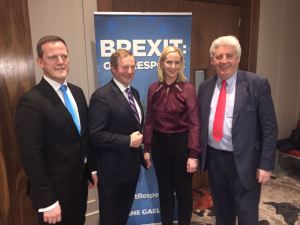 sents. I delivered a speech which touched on the issues for Northern Ireland-implications of Brexit for the border, business and the need to safeguard the principle of consent enshrined in the Good Friday Agreement.
sents. I delivered a speech which touched on the issues for Northern Ireland-implications of Brexit for the border, business and the need to safeguard the principle of consent enshrined in the Good Friday Agreement.
There was an in-depth question and answer session during which the audience put their questions to the panel. Many people were concerned at what Brexit might mean for their jobs and the future opportunities of their children.
It is clear that Ireland’s place in the European Union is more important now than it ever 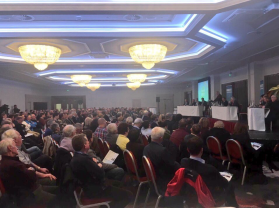 was. The EU Referendum vote in Britain will pose significant challenges for the entire Island of Ireland and we must tackle these challenges together.
was. The EU Referendum vote in Britain will pose significant challenges for the entire Island of Ireland and we must tackle these challenges together.
Please find below the speech I made on Monday night.
Cork, Speech on Brexit, Monday 13 February, 7pm
I strongly advocated and campaigned for a vote to remain within the EU. Long before the 23 June 2016 I had a nightmare that we would sleep walk out of Europe. Unfortunately my worst fears came true and we have been dealing with the fallout and uncertainty of the outcome ever since.
All-Island Dialogue
I salute the Taoiseach and many of his colleagues for attempting to unpick much of the uncertainty through the excellent and engaging All-Island Dialogue which took place on November 2 last year. I look forward to attending the upcoming session on Friday (17 February) as we continue to find a way to navigate through the choppy seas of Brexit.
Europe and Peace
In the aftermath of last June’s result I led a delegation to Brussels to meet with a range of MEPs and key thinkers in Brussels. Many were depressed, in shock, despairing and uncertain about the future.
The one time I saw a spark of interest was when I mentioned the unique and outstanding contribution the EU had made to securing and sustaining peace in Northern Ireland. People lit up when I referenced just what some of the EU peace monies did to transform our region. It is clear that Northern Ireland is seen as the Jewel in the crown of the EU and we must invoke that special relationship in these perilous times.
I have never pretended that the European Union was perfect or that it does not need reform—even radical reform—but the EU has delivered for Northern Ireland. It helped to deliver parity of esteem and prosperity for all sides of our community, and it has helped to bring peace in difficult times.
European investment and access to the single market has done so much in the past 25 years to remake my city, Belfast. It is a world-leading city that faces the 21st century, having had a difficult 20th century, not least because of the hard work of hundreds of people who came to Belfast from across Europe to work and contribute positively to our society, and to help to build a better economy, in the process building prosperity. In my South Belfast Constituency I was proud that 70% of my constituents voted to remain in the EU, with a 70% turnout.
Belfast Agreement
Peace in Northern Ireland culminated in the Belfast Agreement, which was overwhelmingly endorsed by the people of Ireland, North and South, had at its heart the principle of consent and was underpinned by a presumption of membership of the EU by Ireland and Britain. The EU is also referenced in the agreement in relation to the competence of the North South Ministerial Council.
Last week in the House of Commons my SDLP colleagues and I strongly advocated that there should be a commitment by Parliament that Brexit should not be allowed to undermine the Belfast Agreement or its provisions. Just as those who would argue that the EU referendum result needs to be respected, those same people need to respect the fact that the people of Ireland overwhelmingly endorsed the Belfast Agreement and its terms.
Border
Our fears will not be alleviated by clichéd platitudes from the Prime Minister and Secretary of State that there will be no return to the borders of the past-we need much more certainty than that, particularly when our peace and security is in the balance. With 30,000 people crossing the Irish border every day for work we need effective coordination between Dublin, London, Belfast and Brussels to sustain reasonable access to their livelihoods.
Leaving the Customs Union would necessitate customs checks and therefore restrictions on travel at the Irish border. We need to look at an option of Northern Ireland having a “Special Customs” status whereby it is treated as within the Customs Union for goods/services travelling solely within the island of Ireland. There is a precedent for this in the German town of Büsingen which is treated as part of Switzerland for customs purposes. It is essential to our small businesses trading across the border that we remain within the Customs Union and to our exporters that we remain within the Single Market.
Any future British-EU treaty must uphold the principle of consent inherent in the Belfast Agreement, which allows a democratic route to a United Ireland if the majority of people in Northern Ireland desire it. In the case of such a referendum taking place, there must be no uncertainty around Northern Ireland’s direct admission to the EU as a consequence of a vote for a United Ireland.
Role of Europe
My SDLP colleagues were proud to vote against the triggering of Article 50 in the commons two weeks ago and we are determined to fight for the best deal for Northern Ireland. With the current imbalance in the Conservative Party and the continuing turmoil in the Labour Party we will be looking to you, our neighbours in the South to support us. Europe also has a crucial role to play.
Our relationship with our neighbours in Europe is more important now than it ever was. In August of this year I was invited to speak at the ‘Digital Day’ of the Inter-Celtic Festival in Lorient, France. I was struck by the French people’s interest in the unique circumstances of people living in Northern Ireland and had an insight into just how much Europe values one of the jewels in its crown-peace in Northern Ireland.
At the festival I met the French Defence Minister Jean-Yves Le Drain and other French Assembly members who were very concerned about the impact a British withdrawal from Europe will mean for the wider European family. Off the back of these conversations Paul Molac, a French Assembly member invited me to address the French Assembly on 8 November for a debate on Brexit. This debate was packed and again underlined the intense interest in the predicament of Ireland, both North and South in light of Brexit.
Looking Ahead
Two crucial dates loom large on the horizon. In June 2019 we have the European Election and July 2020 sees the end of the current budget and the start of the new budget. So realistically we are facing three to four years of uncertainty and instability.
So what is the role for the European Union during this period of uncertainty? Europe needs to reassure many people who are feeling insecure and frightened about their future prospects. The EU must address;
- The disentangling of Britain from the EU
- Negotiating a new relationship between Britain and the EU
- Re-working a new Europe which is in sync with people’s needs and expectations
What I am doing
The Independent Council on Europe has been meeting over the last couple of months. I was keen to set up such a body in the aftermath of the EU Referendum result. I did so because of the amount of anger and anxiety constituents displayed at a number of public meetings I hosted in South Belfast and beyond. The Council is made up of people from the business, voluntary, community and political world who are determined to get the best deal for Northern Ireland following the EU Referendum result on 23 June of this year.
Steve Aiken MLA, former CEO of the British Irish Chamber of Commerce Chairs the Council, Ian Parsley, Head of the European Movement NI is Vice-Chair and I hold the position of the other Vice-Chair. In 2017 the Council intends to hold a number of seminars on the sectors that will be impacted most by Brexit and try to identify what we can do to mitigate the worst aspects of Brexit for people living in Northern Ireland. We also intend to visit Brussels shortly.
We will continue to do all we can to promote special recognition for Northern Ireland as a European Place of Global Peace-Building. From Brussels, London, Dublin and Belfast there is a duty of care to protect and safeguard the Northern Irish Peace Process, to ensure good relations between the UK, Ireland and the EU and to promote international peace-building in these extremely challenging times.
ALASDAIR MCDONNELL HEARD CUSTOMS EXPERTS WARN OF ‘NO CHOICE’ ON CHECKPOINTS
Article by Andrew Fanning, Business Post (Dublin)
5 February 2016
SDLP MP for South Belfast Alasdair McDonnell has told The Business Post he is “deeply despondent” about Brexit and the prospect of retaining a seamless border between the Republic and Northern Ireland after Britain leaves the EU.
Dr McDonnell is a member of the British parliament’s Northern Ireland Select Committee, which heard evidence on Wednesday about the future of the border from Michael Lux and Eric Pickett, two customs experts and international trade lawyers.
Lux told the MPs that British prime minister Theresa May’s declaration in Dublin on Monday that she wanted a “seamless, frictionless border” after Brexit amounted to no more than “nice words”.
May said earlier this month that Britain would not be a full member of the EU customs union – in which goods can cross the border without tariffs – after Brexit.
Lux said that although Britain could choose not to have customs controls if it left the EU customs union, the Irish government would have no such choice under EU law.
The SDLP MP described Lux’s evidence as “stimulating”, but added that “the more he talked, the scarier it became”.
“Whatever happens, we’re going to have a border. You cannot control the movement of people or goods without having a checkpoint of some sort,” McDonnell said.
He said Lux made clear that even if this is as seamless as possible, there will be transaction costs for people moving goods across the border.
Concerns about impact on food industry
Lux told the MPs that customs checks would hit the food processing and dairy industries in particular, as the administration involved in transporting ingredients and products across the border would lead to extra costs.
Dr McDonnell has particular concerns about this aspect, saying the island of Ireland has effectively become a single market in this area in the past 25 years. He cited the example of milk, which in some cases crosses the border five times in the course of processing.
“Each one of those crossings entails a customs check and an expense. That’s the worry,” he said. “I don’t want there to be delays, but it is not possible for us not to have some sort of border, and some sort of control, of goods moving up and down,” the SDLP MP said. “Even the perfect solution will require documents to be prepared, which will take up companies’ administrative time,” he added.
“the arrogance of the Brexit wing of the Tory party is frightening”.
The South Belfast MP said he and many other people have been aware that this type of scenario was inevitable, despite others including Theresa May trying to talk it down. He said the Irish Government was aware and had done “a massive amount of work behind the scenes” trying to minimise the effects. But he urged the government in Dublin now to redouble its efforts to minimise the effects of Brexit on the border.
“Europe has very clear guidelines, with all sorts of waivers and special adjustments around the edges, but these can only be worked if both sides want to work them, and the arrogance of the Brexit wing of the Tory party is frightening,” McDonnell said.
“Ultimately, the easy way to deal with this is to retain the island of Ireland as a customs union,” he said. Lux said at the hearing that it may be possible for Northern Ireland to remain in the customs union for a transitional period after Brexit, but then there would have to be controls between the North and the rest of the UK.
Speaking about the House of Commons vote in favour of the bill enabling the British government to trigger Article 50, Dr McDonnell said the debate against the bill had been driven by the Scottish Nationalists.
And he predicted that Brexit could have longer-term consequences, due to what he called the “delusional” anti-European wing of the Conservative Party.
“Effectively, what they have done is started a process that will only be complete when Scotland is independent and Ireland is united. That’s the only solution. Any other solution will be temporary and dysfunctional,” the SDLP MP said.
ORAL QUESTION ABOUT THE CUSTOMS UNION – MOVEMENT OF GOODS AND SERVICES BETWEEN NORTHERN IRELAND AND REPUBLIC
01 February 2017
Alasdair McDonnell MP “May I agree with the Secretary of State in that we are very impressed with the strength of the Union, too––that is, the European Union? Beyond the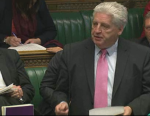 common travel area, there appears to be a significant gap between the wishful thinking and the reality of movement of goods. What assessment has the Secretary of State made of the effect of exiting the customs union on the movement of goods and services between Northern Ireland and the Republic?”
common travel area, there appears to be a significant gap between the wishful thinking and the reality of movement of goods. What assessment has the Secretary of State made of the effect of exiting the customs union on the movement of goods and services between Northern Ireland and the Republic?”
James Brokenshire MP “As the hon. Gentleman will have seen, the Prime Minister’s 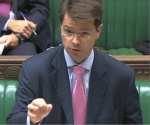 speech underlined the clear desire of the Government in the negotiations ahead to get the best possible trading arrangements with the European Union and therefore we are reflecting on how we do that, whether that is some form of membership of a customs union or a bespoke customs agreement. He should be intent on our desire to get that deal and to see a frictionless border between Northern Ireland and the Republic of Ireland”.
speech underlined the clear desire of the Government in the negotiations ahead to get the best possible trading arrangements with the European Union and therefore we are reflecting on how we do that, whether that is some form of membership of a customs union or a bespoke customs agreement. He should be intent on our desire to get that deal and to see a frictionless border between Northern Ireland and the Republic of Ireland”.
SPEECH IN HOUSE OF COMMONS DETAILING WHY I AM UNABLE TO SUPPORT THE TRIGGERING OF ARTICLE 50
31 January 2017 – House of Commons
EUROPEAN UNION (NOTIFICATION OF WITHDRAWAL) BILL
I am unable to support this Bill and the triggering of article 50. Like Mr Clarke, I think that the whole operation is a bit like following a rabbit into the hole and hoping to emerge in Wonderland, with or without Alice.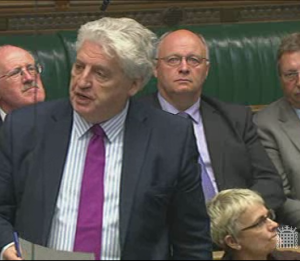
Like my colleagues and many other Members, I do not seek to deny England or Wales their right to exit the European Union, if that is what the people of those nations have decided. I might disagree with the wisdom of that view, but that is not why I oppose the Bill. I have never pretended that the European Union was perfect or that it does not need reform—even radical reform—but the EU has delivered for Northern Ireland. It helped to deliver parity of esteem and prosperity for all sides of our community, and it has helped to bring peace in difficult times. European investment and access to the single market has done so much in the past 25 years to remake my city, Belfast. It is a world-leading city that faces the 21st century, having had a difficult 20th century, not least because of the hard work of hundreds of people who came to Belfast from across Europe to work and contribute positively to our society, and to help to build a better economy, in the process building prosperity.
I am here today on behalf of the people of South Belfast, where 70% voted to remain on a 70% turnout, so the result is without doubt. I ask the Government not to take away unnecessarily our membership of the EU, which has already done so much for my constituency and has the potential to do more. Queen’s University Belfast in the heart of my constituency is highly dependent on EU funding for its research and development, but I have received no guarantees—in fact, I have little expectation—that the Government will match that funding post-Brexit.
The Prime Minister and the Secretary of State have already said, both here and elsewhere, that they have no desire to return to the borders of the past. I am glad to hear that, and so are the 30,000 people who cross the Irish border every day for work, but they need a bit more than warm words of comfort. They need a concrete arrangement between Dublin, London, Belfast and Brussels to sustain reasonable access to their livelihoods, but the Government seem to have missed the fact that our concerns in Northern Ireland go much deeper than just avoiding border posts. Our membership of the EU is written throughout the fabric of the Good Friday agreement, or the Belfast agreement as some prefer to call it. Our political settlement in 1998 keeps all our parties at the table and sustains a peace process, and hopefully a better prosperity process to follow. The EU values and rules that are written into the fabric of that agreement have helped to maintain stability. Without the EU, that stability would not have been obtained and maintained. Maintaining that stability and the settlement requires the principles of the Good Friday agreement to be underpinned in law throughout the exit process, both at the outset and in the final exit deal, and that is without even touching on the wider concerns that hon. Members have raised about the impact of Brexit on our universities, the rights of European citizens already living here and the rights of our own citizens who wish to study or work across the European Union.
Regardless of the Supreme Court’s decision on the role of the devolved Administrations, which I beg to differ from, it is in the Government’s interest to get this process right for Northern Ireland and to maintain the political stability that has been achieved. Indeed, as a co-guarantor of the 1998 Good Friday agreement, the Government are obliged to sustain that stability.
It will be much harder to get things right and to restore stability in Northern Ireland if we rush to meet an artificial timetable that has been imposed unnecessarily by the Government. That is why I call on them, even at this late stage, not to rush now and regret later. I beg them to take the time to get this right for all of us. Earlier today the Secretary of State told us to trust the wisdom of the people. Well, there is no one I trust more with the future of Northern Ireland than the people of Northern Ireland, and the people of Northern Ireland voted to remain. I remind the House that people in Belfast South voted by 70%, on a 70% turnout, to stay in Europe. I hope that I am representing them and their views here today. With no answers—or, at the very best, foggy answers—about the border, our economy and protecting parity of esteem, my colleagues and I cannot vote to support the triggering of article 50.
DR. ALASDAIR MCDONNELL MP SIGNS HOLOCAUST EDUCATIONAL TRUST BOOK OF COMMITMENT
This week Dr. Alasdair McDonnell MP signed the Holocaust Educational Trust’s Book of Commitment, in doing so pledging his commitment to Holocaust Memorial Day and honouring those who were murdered during the Holocaust as well as pa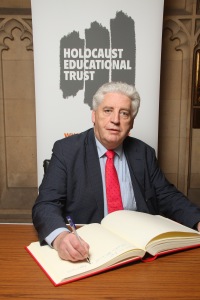 ying tribute to the extraordinary Holocaust survivors who work tirelessly to educate young people.
ying tribute to the extraordinary Holocaust survivors who work tirelessly to educate young people.
Friday 27th January will mark the anniversary of the liberation of the Nazi concentration and death camp Auschwitz-Birkenau, the site of the largest mass murder in history.
In the lead up to and on Holocaust Memorial Day, thousands of commemorative events will be arranged by schools, faith groups and community organisations across the country, remembering all the victims of the Holocaust and subsequent genocides. The theme for this year’s commemorations is ‘How can life go on?’
After signing the Book of Commitment, Dr. Alasdair McDonnell MP commented:
“Holocaust Memorial Day is an important opportunity for people from South Belfast to reflect on the tragic events of the Holocaust. As the Holocaust moves from living history, to just history, it becomes ever more important that we take the time to remember the victims and also pay tribute to the survivors. I would encourage my constituents to show their support for such an important day.
Karen Pollock MBE, Chief Executive of the Holocaust Educational Trust, said:
Our mission is to educate young people from every background about the Holocaust and its contemporary relevance. We are very grateful to Dr. Alasdair McDonnell MP for signing the Book of Commitment, signalling a continued commitment to remembering the victims of the Holocaust as well as challenging antisemitism, prejudice and bigotry in all its forms.
WHAT ARRANGEMENTS WILL THE UK GOVERNMENT MAKE TO ACCOMMODATE THE 70% OF MY CONSTITUENTS WHO VOTED TO REMAIN IN THE EU AND INTEND TO RETAIN THE BENEFITS?
On the 17 January 2017, I asked the Secretary of State for Exiting the EU, Mr David Davis about what arrangement will the UK Government make to accommodate the 70% of my constituents who voted to remain in the EU and intend to retain the benefits.
Alasdair McDonnell “I commend the right hon. Member for Broxtowe (Anna Soubry) for her sanity and common sense, and the right hon. and learned Member for Rushcliffe (Mr Clarke) for bringing a degree of integrity to the discussion.
Does the Secretary of State for Exiting the EU recognise that I, and thousands of others in  Northern Ireland, will not be leaving the EU willingly? We recognise the very significant benefits that have flowed from EU membership. We hold EU passports and we intend to retain them. What arrangements will he make to accommodate us, the people like me and the 70% of my constituents who voted to remain in the EU and intend to retain the benefits? Will he, while he is at it, perhaps tell us how he intends Northern Ireland to have its voice heard at Joint Ministerial Committee meetings and in the negotiations generally over the next three months?”
Northern Ireland, will not be leaving the EU willingly? We recognise the very significant benefits that have flowed from EU membership. We hold EU passports and we intend to retain them. What arrangements will he make to accommodate us, the people like me and the 70% of my constituents who voted to remain in the EU and intend to retain the benefits? Will he, while he is at it, perhaps tell us how he intends Northern Ireland to have its voice heard at Joint Ministerial Committee meetings and in the negotiations generally over the next three months?”
David Davis “Since the beginning of this process—since I took up my post—we have put the preservation of the stability and the interests of Northern Ireland pretty much at the top of the tree of the negotiations, particularly on issues such as maintaining an open bo rder and preserving the economic basis of Northern Ireland, which is very dependent on trade with the Republic of Ireland. On the JMC, I do not know if it has gone yet but yesterday I approved a letter to the Northern Ireland Executive—although the next Government is now subject to an election, most Ministers are still in place—asking that during the interim period they send representatives, whether ministerial or otherwise, so that we are always across the interests of Northern Ireland. The hon. Gentleman must take it as read that I am absolutely committed to maintaining the stability, peace and prosperity we have got used to in the last several years.”
rder and preserving the economic basis of Northern Ireland, which is very dependent on trade with the Republic of Ireland. On the JMC, I do not know if it has gone yet but yesterday I approved a letter to the Northern Ireland Executive—although the next Government is now subject to an election, most Ministers are still in place—asking that during the interim period they send representatives, whether ministerial or otherwise, so that we are always across the interests of Northern Ireland. The hon. Gentleman must take it as read that I am absolutely committed to maintaining the stability, peace and prosperity we have got used to in the last several years.”
ASKING QUESTIONS ABOUT RHI, PUBLIC INQUIRY AND THE ASSEMBLY ELECTION
On the 17 January 2017, I asked the Secretary of State for Northern Ireland, James Brokenshire about the RHI scandal, the need for a public enquiry, restoring public confidence in the political settlement and what will happen after an election in Northern Ireland.
Alasdair McDonnell MP “Will the Secretary of State share with us more of his thoughts on what he expects to happen after an election in Northern Ireland? Does he accept that the problems will remain? Without his calling a public inquiry on the RHI or, if he cannot find a way to do that, his making it clear that he fully supports a public inquiry, public confidence in our political settlement will sink even lower, making restoration of the Executive even more difficult. That is what people have been telling me on the streets during the past few days and the past week. They said that they need clarity, as we are having an election in a fog”.
problems will remain? Without his calling a public inquiry on the RHI or, if he cannot find a way to do that, his making it clear that he fully supports a public inquiry, public confidence in our political settlement will sink even lower, making restoration of the Executive even more difficult. That is what people have been telling me on the streets during the past few days and the past week. They said that they need clarity, as we are having an election in a fog”.
James Brokenshire “Clearly, RHI scheme issues have been very much at the heart of what has led to the election that I have now called. It is right that we get answers on that, because it is crucial to  re-establishing trust and confidence, seeing accountability and giving answers to the public about what has taken place. As I have said, it is right for that to come from Northern Ireland, as much as is possible, as this was a devolved issue and something that related to decisions within Northern Ireland. But I stand ready to work with people and consider options on a cross-community basis where support is commanded across the community. This is about how we get those answers and inject confidence back into the whole process”.
re-establishing trust and confidence, seeing accountability and giving answers to the public about what has taken place. As I have said, it is right for that to come from Northern Ireland, as much as is possible, as this was a devolved issue and something that related to decisions within Northern Ireland. But I stand ready to work with people and consider options on a cross-community basis where support is commanded across the community. This is about how we get those answers and inject confidence back into the whole process”.
PROPOSED REMOVAL OF RATES CAP IN NORTHERN IRELAND – PUBLIC MEETING
On Monday 16 January 2017, Dr. Alasdair McDonnell MP held a Public Meeting in the Wellington Park Hotel to hear the views of constituents on the proposed removal of the rates cap announced by Finance Minister, Máirtín O’Muilleoir MLA.
On the panel was Dr. Alasdair McDonnell MP, Cllr Declan Boyle (Botanic) and Ray Farley from the Fair Rates Campaign.
Dr. Alasdair McDonnell MP explained that he organised the meeting because Cllr Declan Boyle and himself had been inundated with calls, emails and text messages from constituents concerned about the impact of removing the rates cap.
After a brief introduction from all the panellists, Alasdair opened the meeting to the floor as the main focus was to hear the views/concerns of local constituents.
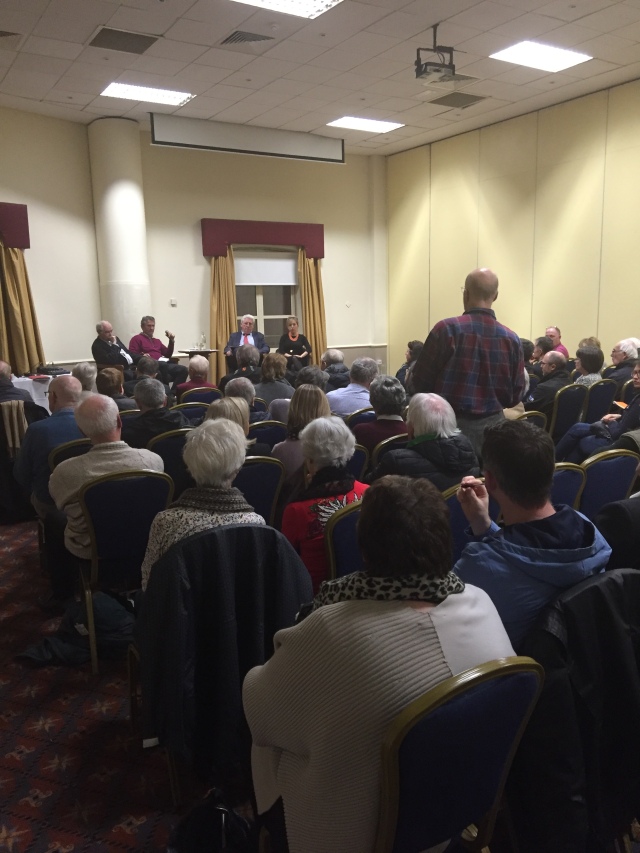
A wide range of concerns were raised from the floor as we heard from single persons, pensioners and parents with young families.
There was a consensus that a more equitable approach should be taken by Finance Minister, Máirtín O’Muilleoir MLA.
It was also stressed that the Rating System needs to be properly updated but should reflect best practices in other jurisdictions.
With the uncertainty at Stormont and the forthcoming Assembly Election this proposal may be shelved but we cannot be sure it won’t come back in 6 months time.
This is why I am urging you to respond to the Consultation Paper of the Rates Rethink.
You can print/download the consultation paper by clicking on the link https://www.finance-ni.gov.uk/consultations/rates-rethink
Queries and consultation responses should be sent to: ratingpolicy.cfg@finance-ni.gov.uk
Written responses to: Rating Policy Division, FinTru House, 1 Cromac Avenue, Gasworks Business Park, Belfast, BT7 2JA.
The deadline for submission of consultation responses is 16 February 2017 at 17:00.
McDONNELL MOURNS LOSS OF DEAR FRIEND-TK WHITAKER
MP for South Belfast Dr Alasdair McDonnell has said he is deeply saddened at the passing of one of Ireland’s greatest economic and political minds-TK Whitaker

Speaking following his death yesterday Dr McDonnell said:
“TK Whitaker has been a seminal figure in Irish life for the past century. He played an absolutely pivotal role in improving economic standards of living across the Island of Ireland. We are all deeply saddened at the passing of someone who has helped shape modern day Ireland as we know it.
In the North we should be particularly grateful for the interest TK Whitaker showed in our troubled past and for his help in moving us along the road to peace and greater prosperity. TK Whittaker wrote a policy document in 1971 called ‘A Possible Solution’ which effectively became the very basis of the Good Friday Agreement almost 30 years later-for that we are eternally in his debt.
TK Whitaker has received many plaudits and awards over the years which were richly deserved. I was delighted that the SDLP arranged a special tribute lunch in Dublin for him in October 2014 which was supported by hundreds of key friends and supporters.
Only last month TK Whitaker reached his 100th Birthday-a milestone celebration for a man who devoted his life to improving the outlook and circumstances of every citizen right across the Island of Ireland. We are much poorer today for his passing-but take heart and inspiration from his incredibly rich legacy of work.”
PROPOSED REMOVAL OF RATES CAP IN NORTHERN IRELAND BY MINISTER MÁIRTIN O’MUILLEOIR
DO YOU WANT YOUR HOUSEHOLSD RATES BILL TO INCREASE?
This will happen under the proposals put forward by South Belfast MLA and Finance Minister Máirtín O’Muilleoir.
His plan, which he describes as the “biggest shake up in rating policy in a generation” includes a removal of the existing rates cap.
The current rating system caps the rateable value of household properties at £400,000, but the Minister wants to do away with this cap. This means that any homes with a value over £400,000 will now be subject to rates levied on any potential value over £400,000.
If you feel you could be affected by the proposed changes, please join us at 7pm on Monday 16 January 2017 in the Wellington Park Hotel.
Please see below the leaflet I have been distributing throughout South Belfast.
REPRESENTATIONS MADE TO GOVERNMENT ABOUT DEMOLITION OF BEDOIUM VILLAGE OF UMM AL-HIRAN IN SOUTHERN ISRAEL
In late November 2016, I was contacted by a large number of constituents concerned about the proposed demolition of the Bedoiun village of Umm al-Hiran in Southern Israel.
In response to the concerns raised with me I sent an urgent letter to the Foreign Secretary, Rt. Hon Boris Johnston MP (see below).
Umm al-Hiran was established in 1956, after its residents were displaced by Israel from Khirbet Zabaleh.
Following a long legal battle, bulldozers were due to enter the village and demolish it.
In my letter I asked that the Government make urgent representations to the Israeli Government and encourage them to lift the threat of demolition.
I received a response (see below) from Tobias Ellwood MP, Parliamentary Under Secretary of State responsible for relations with the Middle East.
As you can see from the letter the planned demolition of Umm al-Hiran was raised with the Israeli Ambassador on the 23 November 2016.
Istanbul Convention: Private Members Bill – Preventing and Combating Violence against Women and Domestic Violence (Ratification of Convention) Bill
A Private Members Bill was brought before the House of Commons by Dr. Eilidh Whiteford MP and called on the Government to commit to a timetable of ratifying the Istanbul Convention, an international treaty which has been described as the “gold standard” of legislation for gender-based violence.
On Friday 16 December 2016, I attended the debate and with the other two SDLP MP’s voted for the Bill that would ratify the Istanbul Convention on violence against women.
Whilst I was unable to speak on the Bill, I was delighted to vote in favour of it and was glad to see the Bill successfully progress to the Committee Stage.
If the Bill is passed, the UK Government will be obliged to guarantee funding for shelters, rape crisis centres, helplines and education in schools on healthy relationships.
The UK was involved in the development of the legally binding pan-European treaty; however, despite signing the Istanbul Convention in June 2012, the Government has yet to ratify it, making it legally binding.
I can assure you that the SDLP MP’s will continue to support this Bill.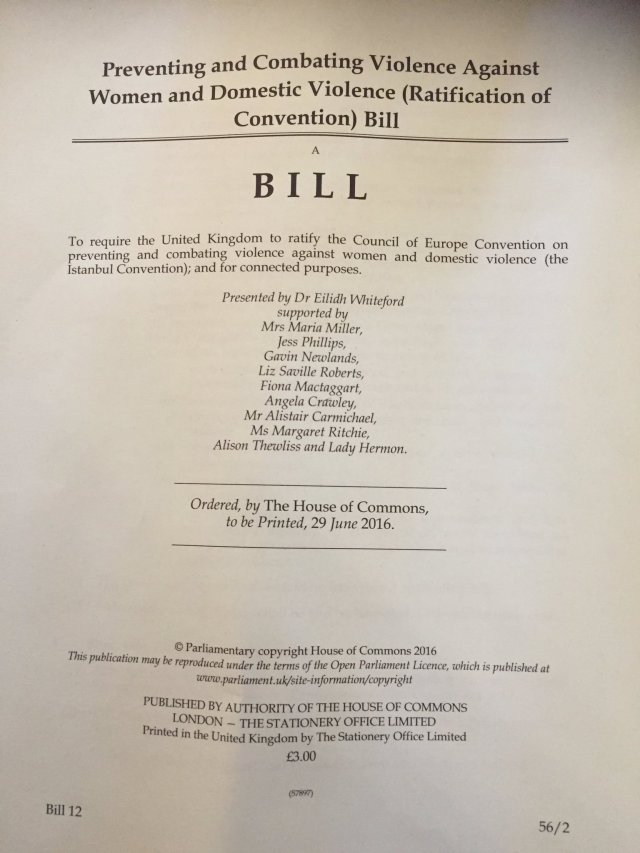
Prior to the debate, I also raised a written Parliamentary Question on the time taken to ratify the Istanbul Convention with the Secretary of State for the Home (Home Secretary), see the question and reply below.
Question:
To ask the Secretary of State for the Home Department, what assessment she has made of the effect of the time taken to ratify the Istanbul Convention on women who have experienced domestic, sexual, emotional and financial violence in the last four years. (56493) Tabled on: 07 December 2016
Answer:
The Coalition Government signed the Istanbul Convention in 2012 to show its strong commitment to tackling violence against women and girls (VAWG), and this Government remains absolutely committed to ratifying it. Given that in most respects measures already in place to protect women and girls from violence comply with, or go further, than the Convention requires, time taken to ratify the Convention has not impacted on women who experience violence and abuse. Our cross-Government VAWG strategy sets out our ongoing commitment to tackling these crimes, and is underpinned by increased funding of £80 million. The Government has already taken extra-territorial jurisdiction (ETJ) for female genital mutilation and forced marriage, but before the Convention is ratified we need to take ETJ over a range of other offences. We will seek to legislate when the approach to implementing ETJ is agreed and Parliamentary time allows.
THE COMMITTEE ON THE IMPLEMENTATION OF THE GOOD FRIDAY AGREEMENT
Alasdair travels to Dublin every other week to sit on the Oireachtas Committee on the Implementation of the Good Friday Agreement. Over the past number of months the Committee have been hearing evidence on the implications of Brexit for the Island of Ireland.
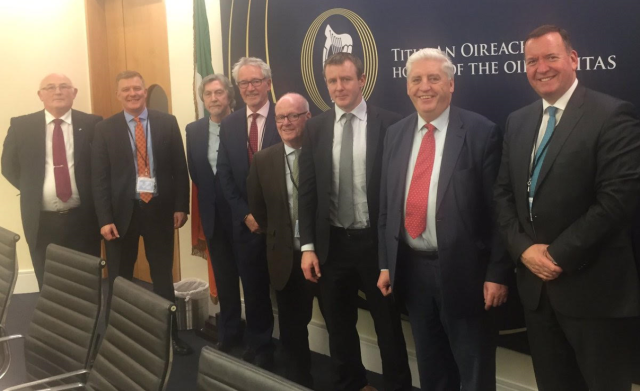
On Thursday 15 December the Committee heard how border regions would be adversely effected by uncertainty over border control and other issues. Witnesses included Peter Conway, Waarenpoint Harbour, Michael Blayney, Autoline, Conor Patterson WIN and Newry Chamber.
EU WITHDRAWAL AND ITS IMPACT ON THE GOOD FRIDAY AGREEMENT
On the 25 October 2016, I asked the Prime Minister Theresa May about EU withdrawal and the impact it would have on the Good Friday Agreement and the 1998 political settlement.
Alasdair McDonnell “The Prime Minister will be aware that much of the foundation and many of the elements of the 1998 settlement and peace agreement in Northe rn Ireland were referenced and rooted in EU approaches and processes of laws and that leaving the EU will significantly destabilise the foundations of that settlement. Has the Prime Minister given any consideration to the extent of the potential damage the withdrawal from the European Union could do to that Good Friday/Belfast agreement and the 1998 political settlement? Does she have any plan at this stage to protect that settlement?”
rn Ireland were referenced and rooted in EU approaches and processes of laws and that leaving the EU will significantly destabilise the foundations of that settlement. Has the Prime Minister given any consideration to the extent of the potential damage the withdrawal from the European Union could do to that Good Friday/Belfast agreement and the 1998 political settlement? Does she have any plan at this stage to protect that settlement?”
The Prime Minister “There is no reason to believe that the outcome of the referendu m will do anything to undermine the absolute rock-solid commitment of this Government and the people of Northern Ireland to the settlement that was set out in the Belfast agreement.
m will do anything to undermine the absolute rock-solid commitment of this Government and the people of Northern Ireland to the settlement that was set out in the Belfast agreement.
There is, and remains, strong support for the entirely peaceful future for Northern Ireland. That has been determined by democracy and consent. We remain committed to that and to work with others to ensure that entirely peaceful future.”
PRIME MINISTER REITRATES POST-BREXIT BORDER PLEDGE
On the 12 October 2016, I asked the Prime Minister Theresa May a question about post-Brexit border controls.
Alasdair McDonnell “The Prime Minister will be aware that the soft border between Norther![Dr-Alasdair-McDonnell[1]](https://southbelfast.files.wordpress.com/2014/01/dr-alasdair-mcdonnell1.jpg?w=120&h=150) n Ireland and the Irish Republic was vital in boosting the economy of Northern Ireland. Does she understand the confusion that has set in, and that many of us feel? On the one hand, the Government define their intention tightly to control the free movement of people and labour, yet on the other they assure us that that border between Northern Ireland and the Republic will continue to be open. Does she see the contradiction for many of those directly affected, and whose jobs are affected?”
n Ireland and the Irish Republic was vital in boosting the economy of Northern Ireland. Does she understand the confusion that has set in, and that many of us feel? On the one hand, the Government define their intention tightly to control the free movement of people and labour, yet on the other they assure us that that border between Northern Ireland and the Republic will continue to be open. Does she see the contradiction for many of those directly affected, and whose jobs are affected?”
The Prime Minister “I have been clear, the Secretary of Stare for Northern Ireland has bee n clear, and the Taoiseach has also said that, on both sides of the border, we do not want to see a return to the borders of the past. It is worth reminding the House that the common travel area has been in place since the 1920s, so it was there well before we were both members of the European Union.
n clear, and the Taoiseach has also said that, on both sides of the border, we do not want to see a return to the borders of the past. It is worth reminding the House that the common travel area has been in place since the 1920s, so it was there well before we were both members of the European Union.
We are working with the Government of the Republic, and I have had discussions on this with the First Minister and the Deputy First Minister of Northern Ireland. We want to ensure that we do not see a return to the borders of the past.”
You can check the media coverage of the PMQ at http://www.bbc.co.uk/news/uk-northern-ireland-37638019





